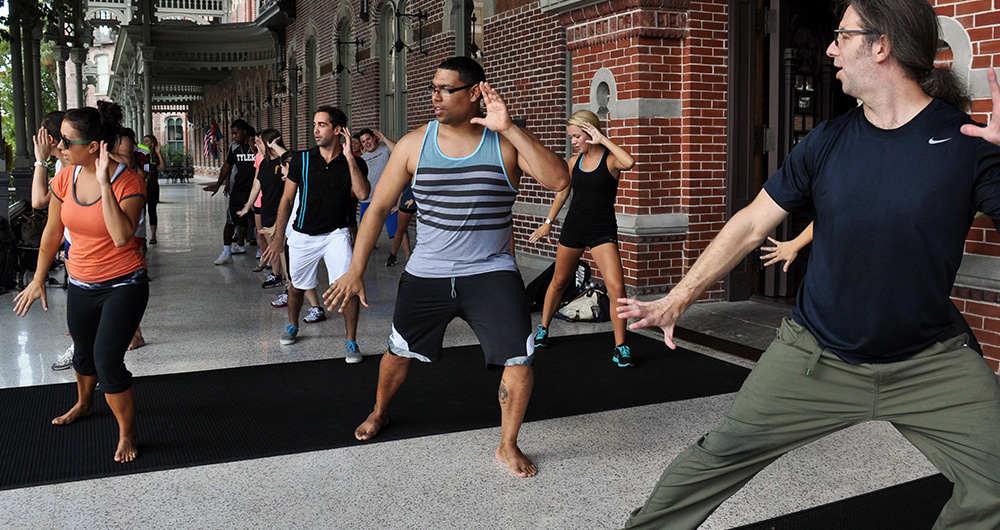The Department of Philosophy and Religion offers programs that introduce students to a wide variety of philosophical traditions and issues and that emphasize critical thinking and logical reasoning. The programs can be helpful to students considering law school, medical school or graduate school, as well as to any student looking for a strong foundation in a core liberal arts discipline.
Philosophy and Religion Degrees

Students can pursue a philosophy major or philosophy minor with the option of adding an Asian studies minor.
The philosophy major offers a balanced set of courses that introduce and hone skills of critical thinking and argumentation. It gives students a solid background in the history of philosophical systems and ideas, exposing them to a variety of philosophical issues in ethical theory, applied ethics, social and political philosophy, aesthetics, philosophy of science, philosophy of mind, philosophy of religion and Asian philosophy. As a capstone experience, a student may choose to complete a senior thesis project that involves researching particular philosophical topics. The major can be either a stand-alone major or a second major that complements work done in another field.
Topics of Study
The philosophy program offers courses that cover many different fields, including:
- Ethics (ethical theory and the history of ethics)
- Applied ethics (biomedical ethics, environmental ethics, business ethics, etc.)
- History of philosophy
- Aesthetics (including philosophy of art and philosophy of film)
- Philosophy of mind
- Philosophy of science
- Political philosophy
- Philosophy of law
- Feminist philosophy
- Logic and critical thinking
- Philosophy of religion
- Indian, Buddhist and Chinese philosophy
Any 200-level course (and even some 300-level courses) can be a good first course in philosophy.
To learn more, see Philosophy Degree Requirements and Philosophy Minor Requirements.
Frequently Asked Questions
Answer: Yes! Contrary to popular belief, recently published statistical surveys show that philosophy majors are not only highly employable but also enjoy higher average salaries than most other majors, including majors more traditionally associated with business and industry.
According to PayScale.com:
- Philosophy majors enjoy a higher average mid-career salary ($94,300) than a majority of other majors, including:
- Accounting
- Biology
- Business Administration
- Business Management
- Criminology
- Education
- Entrepreneurship
- Film
- Journalism
- Marketing & Mass Communications
- Nursing
- Pre-law
- Pre-medicine
- Psychology
- Public health
- Sociology
According to a Wall Street Journal report of 50 college majors, philosophy majors enjoy the highest average starting-to-mid-career salary increase (103%) of all reported majors.
According to Payscale.com, Philosophy majors earn the 8th highest average top-10% salary ($168,000) of all reported majors. This is higher than all of the following majors:
- Accounting
- Aerospace engineering
- Business management
- Chemistry
- Civil engineering
- Communications
- Computer engineering
- Computer science
- Criminal Justice
- Health care administration
- Mechanical engineering
- Nursing
- Sociology
According to US News & World Report,
A Wall Street Journal analysis of the long-term earning potential of people with various college majors revealed that philosophy majors tend to get raises and promotions more quickly than individuals with other majors, and a result of this rapid career progression is that philosophy majors' mid-career earnings are usually double the size of their starting salaries.
In addition, a statistical analysis conducted by FiveThirtyEight analytics company in 2015 revealed that, among bachelor's degree recipients with just a college degree, philosophy majors had the fourth-highest median annual salary – $81,200 – with earnings that eclipsed that of majors that are often presumed to be more useful, such as business.
Answer: Recently published employer interviews indicate that employers find philosophy majors to be uncommonly open-minded, analytical and innovative. Furthermore, according to an 18-year study of 550,000 college students by the National Institute of Education (as reported by the Chronicle of Higher Education), philosophy majors are uncommonly well-educated. Philosophy majors on average score:
- Higher on the Law School Admissions Test (LSAT) than every college major besides economics and mathematics;
- Higher on the Graduate Management Admission Test (GMAT, or "business school entrance exam") than every college major besides mathematics, including 15% higher than business majors;
- Higher on the verbal and analytic portions Graduate Records Examination (GRE, or "graduate school entrance exam") than every other college major; and
- Higher on the quantitative portion of the GRE than every other humanities major.
Philosophy majors have also been reported to have the highest medical school acceptance rate (50%) of all college majors.
Answer: We live in an increasingly complex world - morally, socially, politically and economically. An undergraduate degree in philosophy challenges a person to think carefully and clearly about this entire array of issues in a way that no other undergraduate major does. Philosophy majors are uniquely well-equipped to think critically about the world in which they will live for the rest of their lives.
Answer: Yes, many of our students are double-majors. All you need to do is change your plan of study in Workday.


